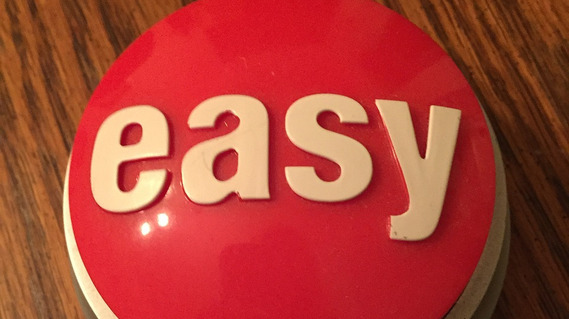Rationalizing the easy way
A second method of temptation involves rationalizing the advantages of the easy way rather than accepting the truth that the Father's way sometimes involves hardship. We see this in the temptation to overcome the alienation of the world by compromising the basic core belief in God. The alternative is the obviously more difficult path of being a prophet and a suffering servant.
Reflection - Techniques
http://www.usccb.org/bible/readings/030316.cfm
Jeremiah 7:23-28
Luke 11:14-23
Although Luke has the Pharisees refer to the 'Beelzebub', a local pagan god, the response of Jesus makes it clear that they are actually equating Beelzebub with Satan when they make their accusation against him. “By the power of Beelzebul, the prince of demons, he drives out demons.”
Every time I have read of this incident I find their words astonishing. The charge seems radically at odds with the scene they have just witnessed and even more dissonant when viewed in the context of the words and actions of Jesus in the preceding chapters. I have wondered if Luke is just exaggerating. What could have prompted such an indictment by Jesus' contemporaries? In what could that indictment have been grounded? My questioning took me back to the beginning of Jesus public life and the possibilities with which he was tempted in the desert. All three of the desert temptations relate directly to the character of Jesus' Messianic mission, and scholars discuss that fact at length. But, because of the outcry of the Pharisees in today's story, I wanted to take another look at the techniques by which evil tempts. How exactly did he go about his attempts at subversion?
Luke initially notes that Jesus was fasting while he was in the desert. This sets the occasion for the first temptation---turn stones into bread. The second temptation follows: All the kingdoms of the world will be handed over to you if only the Lordship of Satan is acknowledged. The third temptation envisions Jesus on the pinnacle of the temple where he is invited to demonstrate his trust in God by throwing himself down from that height since
'He [God] will give his angels charge of you, to guard you,
On their hands they will bear you up,
lest you strike your foot against a stone.'
Satan' handbook offers a variety of insidious ways useful for misleading and spreading evil. The first, which came immediately to mind as I read of Jesus' temptations in the desert, was Satan's expert manipulation of our weaknesses. Jesus had been fasting and was hungry. His time of fasting was now over; so Satan made a 'reasonable' suggestion. Jesus should use his power to satisfy his hunger ---turning stones into bread would do the trick.
A second method of temptation involves rationalizing the advantages of the easy way rather than accepting the truth that the Father's way sometimes involves hardship. We see this in the temptation to overcome the alienation of the world by compromising the basic core belief in God. The alternative is the obviously more difficult path of being a prophet and a suffering servant.
A third method by which Satan spreads his evil is quite common, and is often used alone, probably because it is so successful. Twist the truth to the point that it becomes a lie. Subtle, gentle, easy twists. But, as Jesus points out: The promise of protection by the Angels is not proffered as an invitation to test God, but rather is offered in the same spirit as the Lord's promise to hold us in the palm of his hand.
The scene of Jesus with the Pharisees which Luke presents today was anticipated, and even played out, long before the incident Luke records here. We just. read the passage. A few centuries earlier God Himself described the issue while speaking to the prophet, Jeremiah.
When you speak all these words to them,
they will not listen to you either;
when you call to them, they will not answer you.
Say to them:
This is the nation that does not listen
to the voice of the LORD, its God, or take correction.
Faithfulness [to the Lord] has disappeared; the word [faithfulness] itself is banished from their speech.
Just as Satan tempted Jesus, so he tempted the Pharisees. It seems that the Pharisees listened to the words of the evil one and that, as God told Jeremiah, faithfulness to the Lord had disappeared.
The first technique from evil's playbook was to seek out and exploit the Pharisees' weakness. Though obvious to us today, that weakness was probably deeply hidden from them. What was it? It was an ordinary one; we call it fear--- fear of change, fear of a disruption in their lives, fear of facing their own need for repentance. And, because that weakness was easily aroused, anger in the face of disruption was immediate. They had been, and still were, content to follow the easy way, one which they had chosen many years before: Get along with the Romans; bend to the will of Caesar; let your hearts and minds gradually be re-shaped in the Roman way. And finally, all of this takes form in their verbal outburst: “By the power of Beelzebul, the prince of demons, he drives out demons.” Note well, the truth in their statement. It is by a power beyond the capabilities of man that Jesus does what he does. But the truth has been twisted into a gross imitation of reality. It is not by the power of God, but by the power of evil that he drives out demons.
The pattern fits together well, doesn't it?
Find an exploit a weakness.
Hi-light the advantages of the easy way.
Twist the truth (but not too much).
As I explored this strategy I found my thoughts heading in two opposite directions. That was awkward since maintaining one clear line of thought is frequently difficult. Still, the two roads of thought, diverging in my mind, were there. On the one hand, I found viewing Satan's pattern made me nervous. I have weaknesses; some I know; some I don't know. I like the easy way. Doing things the hard way always seems counter productive. And finally, there was a time I half-heartedly thought about becoming a political spin-doctor--- twisting the truth wasn't all that difficult.
On the other hand the Lord's words to Paul offer comforting reassurance. "My grace is sufficient for you, for my power is made perfect in weakness." (2 Corinthians 12:9) Sure, I have weaknesses --- physical, moral, mental --- but the Lord's power is more than sufficient if I turn to Him. He'll even help me discover my weakness if I only ask.
As far as seeking the easy way -- I've found that to be another of those paradoxes of our faith. Just as we find freedom in service, i.e., trying to live our lives in service to our God, so too, the highly disdained 'hard way' is the only 'easy way' in life. Take, for example, what used to be called the corporal works of mercy.
Feed the hungry.
Give drink to the thirsty.
Shelter the homeless.
Visit the sick and the imprisoned.
Bury the dead.
Give alms to the poor.
The easy way would turn all these over to the government and governmental services. God would not be allowed in the picture. We saw how well this operates when Catholic charities were excluded from assisting with adoptions because they will only work with heterosexual couples. The so-called easy way is to take the burden totally to ourselves and our humanitarian agencies, seeking thereby to create a humanitarian paradise. The words of a common Lenten song come to mind. "Your milk and honey seem distant, unreal when we have bread and water in our hands."
We forget that, if we exclude God from Kingship in our humanitarian kingdom, we will, whether we like it or not, still have a king.
Lastly, there remains deceit.
Historically, you know, Satan has been called "the Father of Lies." He still is. But Jesus came. As John tells us Jesus dwelt among us full of grace and truth. (John 1:14); and that grace and truth came through him. (John 1:17). He himself was the truth --- and the way (sometimes hard and sometimes easy but always the Father's way) and the life, life in abundance, life without fear, for the truth will make you free.

